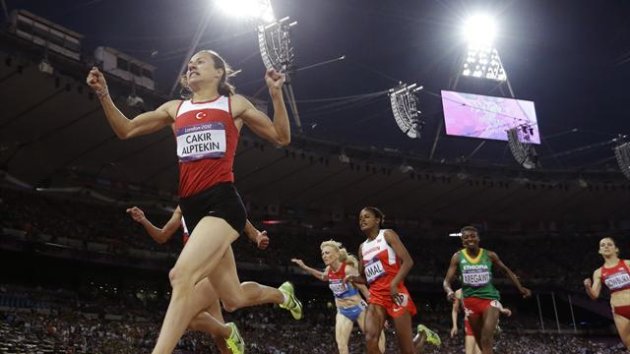Turkey's Asli Cakir Alptekin, who came back from a doping ban to win the women's 1,500 metres under a cloud of suspicion at the 2012 Olympics, faces a lifetime ban after being charged with another anti-doping offence.

Cakir, who was given a two-year ban in 2004 after a positive dope test at the world junior championships, finished at the London Games ahead of compatriot Gamze Bulut, who had improved her personal best by 18 seconds in the previous year.
Cakir was charged on the basis of abnormal blood values from her biological passport.
Another Turkish athlete, double European 100m hurdles champion Nevin Yanit, also faces a ban after "multiple positive findings in both in-competition and out-of-competition tests," the International Association of Athletics Federations said in a statement.
Both athletes have been charged with anti-doping rule violations by the IAAF and are provisionally suspended. Their cases have been referred to the Turkish federation for adjudication and Cakir faces an automatic life ban for a second doping offence.
Ugur Erdener, president of the Turkish Olympic Committee, said in a statement: "We fully support all authorities in this ongoing investigation. Doping is a major global issue: Turkey is ready to fulfil its responsibilities in helping to eradicate it from world sport.
"The Turkish Olympic Committee will continue to intensify our own efforts to root out cheats in Turkish sport. Any athlete found to have cheated will be punished to the full extent of Turkey's comprehensive and rigorously enforced anti-doping legislation."
The burly Cakir's ban will hardly raise eyebrows in the world of athletics, despite her denying the use of performance-enhancing drugs when grilled immediately after her London success.
Shortly after the 1,500 final, Briton Lisa Dobriskey, who finished 10th, voiced her frustration.
"I'll probably get into trouble for saying this but I don't believe I'm competing on a level playing field," she said.
"I think the blood passport is catching people but I think these Games came too soon. People will be caught eventually, I think. Fingers crossed anyway."
It was just that system that eventually did catch the 27-year-old Cakir, nine years after she was exposed as a teenage doper.
Biological passports work by creating individual blood profiles for each athlete, rather than testing for specific, performance-enhancing drugs.
If an athlete's blood readings then deviate markedly from previous measures they can face a doping charge.
Another Turkish athlete, double European 100m hurdles champion Nevin Yanit, also faces a ban after "multiple positive findings in both in-competition and out-of-competition tests," the International Association of Athletics Federations said in a statement.
Both athletes have been charged with anti-doping rule violations by the IAAF and are provisionally suspended. Their cases have been referred to the Turkish federation for adjudication and Cakir faces an automatic life ban for a second doping offence.
Ugur Erdener, president of the Turkish Olympic Committee, said in a statement: "We fully support all authorities in this ongoing investigation. Doping is a major global issue: Turkey is ready to fulfil its responsibilities in helping to eradicate it from world sport.
"The Turkish Olympic Committee will continue to intensify our own efforts to root out cheats in Turkish sport. Any athlete found to have cheated will be punished to the full extent of Turkey's comprehensive and rigorously enforced anti-doping legislation."
The burly Cakir's ban will hardly raise eyebrows in the world of athletics, despite her denying the use of performance-enhancing drugs when grilled immediately after her London success.
Shortly after the 1,500 final, Briton Lisa Dobriskey, who finished 10th, voiced her frustration.
"I'll probably get into trouble for saying this but I don't believe I'm competing on a level playing field," she said.
"I think the blood passport is catching people but I think these Games came too soon. People will be caught eventually, I think. Fingers crossed anyway."
It was just that system that eventually did catch the 27-year-old Cakir, nine years after she was exposed as a teenage doper.
Biological passports work by creating individual blood profiles for each athlete, rather than testing for specific, performance-enhancing drugs.
If an athlete's blood readings then deviate markedly from previous measures they can face a doping charge.
Good!.. We dont want cheating in our sports
ReplyDelete